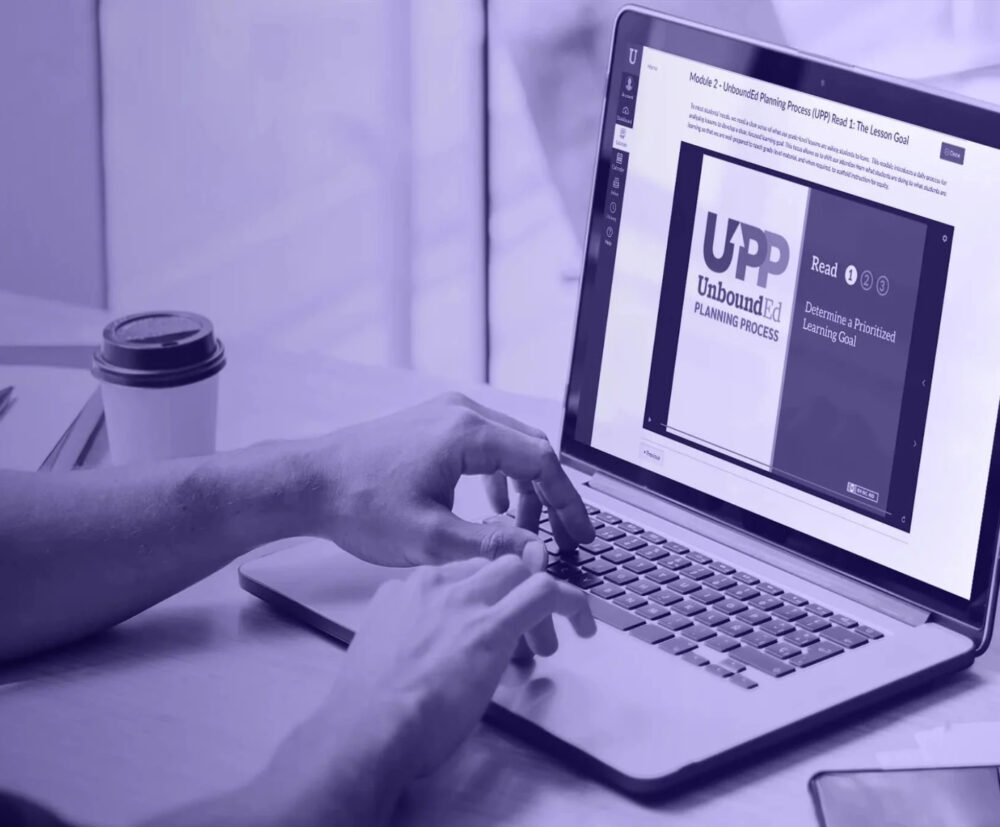UnboundEd’s online modules are created by educators for educators.
The self-paced online modules guide teachers through The Three Reads Lesson Planning Process of identifying the prioritized learning goal and associated learning steps to deliver grade-level, engaging, affirming, and meaningful — GLEAM™ — instruction for all students.
Virtual Professional Learning Community
In our virtual professional learning community, each district or school has its own unique professional learning group where they can access the modules. Districts can identify team members to lead and facilitate the experience via discussion boards and support the learning virtually.
What to Expect from the Self-paced Learning Modules
When you use our modules, you will have access to:
- Asynchronous learning via our platform or licensed on your district/state’s approved Learning Management System (LMS)
- Interactive modules, with durations of 45–60 minutes, that include videos, case scenarios, quiz questions, and opportunities for reflection
- Accompanying resource guides for leaders to extend the learning
Online Modules
-
Module 1: The Standards as a Foundation for Attending to Unfinished Instruction
To plan for student learning needs, we must begin with grade-level learning and provide just-in-time support to address unfinished instruction focused on necessary prerequisites. Module 1 addresses how to use content standards as a foundation for planning lessons that foster equity. We frame students’ grade-level learning needs within the standards’ staircase of complexity to illuminate access points for grade-level learning.
-
Module 2: The Three Reads Planning Process
We need a clear sense of what our grade-level lessons ask students to learn to meet students’ needs. The “Three Reads Planning Process” mini-modules introduce a daily process for analyzing lessons to develop clear, focused objectives. This focus allows us to shift our attention from what students are doing to what students are learning so that we are well-prepared to teach grade-level material, and when required, to scaffold instruction for equity.
- Part a: The Lesson Goal
- Part b: The Learning Steps
- Part c: The Instructional Plan
-
Module 3: Accelerate Student Learning by Scaffolding for Equity
To accelerate student learning, students must engage in grade-level work. We know that some students will require support to access this grade-level learning. This module will build on the Three Reads Planning Process by sharing how to create supports and scaffolds that accelerate student learning by maintaining the equitable, grade-level goals of a lesson.
Who should use the learning modules?
Teachers and coaches interested in learning how to make their grade-level curriculum engaging, affirming, and meaningful should use the Online Modules.

*The Three Reads Lesson Planning Process is only available for use by schools, school districts, teachers, and other not-for-profit educational institutions for their own internal educational use. It is not available for any other commercial or non-commercial use.


Get Started
The UnboundEd Planning Process™ pathway for teachers is available through our Standards Institute™ and Summits.
